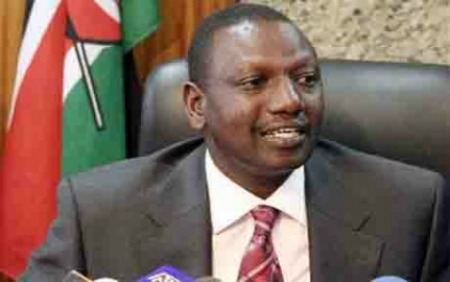
Photo: somaliweyn.org
THE HAGUE, Netherlands (AP) — The International Criminal Court on Friday overturned a decision excusing Kenya’s deputy president from attending his trial on charges of orchestrating deadly violence after his country’s 2007 election.
The decision by appeals judges means William Ruto must – in principle – appear at his trial, but can still be excused on a “case by case” basis.
“The presence of the accused must remain the general rule,” said the court president, Judge Sang-hyun Song.
The ruling could deepen a rift between the court and African leaders who accuse it of unfairly targeting their continent. It could also set a precedent for Kenya’s president, whose trial on similar charges is scheduled to start next month.
The African Union earlier this month said it wanted the U.N. Security Council to defer the Kenya trials at the ICC for a year. The Hague-based court has only indicted Africans in more than a decade of operation.
However, while overturning the decision to issue a blanket excusal from trial for Ruto, the appeals panel left open the option for judges to let Ruto stay at home for parts of his case – but he would have to seek permission each time he wanted to miss hearings.
In June, judges said Ruto could skip most of his trial so that he could exercise his duties as deputy of head of state. Prosecutors appealed and Ruto has, so far, attended much of his case.
The five-judge appeals panel acknowledged that trial judges have the power to excuse a defendant, but “interpreted the scope of its discretion too broadly” in giving Ruto what amounted to “a blanket excusal” from his trial, Sang said.
Trial judges exercised their discretion last month when they adjourned Ruto’s case for a week so he could fly home to deal with the aftermath of the deadly terror attack on an upscale shopping mall in Nairobi.
Ruto, who is on trial alongside broadcaster Joshua Arap Sang, has pleaded not guilty to crimes against humanity for allegedly organizing violence targeting his political opponents after Kenya’s 2007 presidential vote. More than 1,000 people died in tribal clashes in December 2007 and January 2008.
Kenyatta, who was elected president earlier this year, faces similar charges of involvement in attacks on his political rivals after the 2007 vote. He, too, insists he is innocent, and he has asked judges to throw out the case, claiming it is built on false witness testimony and is an abuse of process.
Judges preparing for his trial last week excused him from attending most of the hearings in a case that will likely take many months to complete.
Prosecutors said in a statement they will now ask the panel of judges preparing for Kenyatta’s trial to “reconsider its decision to conditionally excuse Mr. Kenyatta from continuous presence at his trial” or allow prosecutors to appeal the decision.
Meanwhile, Kenyatta asked the court to delay the scheduled Nov. 12 start of his trial, arguing in a written motion that the court should hold a hearing into his claims made earlier this month of abuse of process and that he is still dealing with the fallout from the Westgate mall attack and is needed in Kenya.
Kenyatta’s lawyers said the trial, which already has been pushed back twice, shouldn’t begin before Feb. 12.